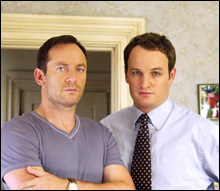
STREET LIFE: Imagine the brothers Bulger moved 50 miles south — and 40 years younger. |
Providence has turned up on television as a cartoon (The Family Guy) and as a randomly selected backdrop for a sentimental, filmed-in-Toronto drama (Providence). Now Showtime has put down roots in the Rhode Island capital for Brotherhood (debuts this Sunday, July 9, at 10 pm), and Providence has never looked so rough — or so real — as a setting for fictional political machinations, crime and punishment.Although Brotherhood’s gangland tales have drawn preliminary comparisons with The Sopranos, the show’s creator, Western Massachusetts–bred Blake Masters, says he was inspired by the Corleone clan and the brothers Bulger. That William grew up to be a statehouse kingmaker while Whitey became a notorious (and still at-large) mobster seems the stuff of airport bookstall fiction. For Brotherhood, imagine the Bulgers moved 50 miles south — and 40 years younger. Nominal “good son” Tommy Caffee is a rising state representative looking after a blue-collar neighborhood referred to as “The Hill.” (The script is cagy about exactly which hill; every ethnic group seems to occupy its own high ground.) Jason Clarke has the perfect face for an ambitious pol: the righteous fire in his eyes, the little lying mouth. Tommy’s rise to power gets interrupted by the return, after seven years’ mysterious absence, of his elder brother, Michael (Jason Isaacs), a criminal enforcer who says only that he “fell down a hole” for a while.
These siblings are near-strangers, and they spend most of the season’s 11 episodes circling each other like wary wolves. Tommy guns for a Speaker’s seat by circulating rumors in the State House men’s room. Michael has a chest full of scars and tattoos (Celtic and Far Eastern) and a violent homophobic streak and is tethered to his worried ma via cellphone. Isaacs, who’s portrayed a series of charming villains (beginning with The Patriot), plays down Michael’s deadly charisma, and he and Clarke both do creditable Roe-Dyeland accents. The bit players too are authentic — check out the city mayor who elbows Tommy out of the way to offer his condolences to a local family.

As the clan’s matriarch, Fionnula Flanagan’s a pistol. Despite her sons’ notoriety, Rose works as a factory supervisor — apparently because she enjoys bossing people around. (When she has to take a job at a Wal-Mart-like warehouse store, she rallies her co-workers to form a union, and with her sons in support, you wouldn’t bet against her.) “Where’s Mom? Probably home alone,” worries favorite son Michael, not realizing that his hot-to-trot mother’s meeting yet another boyfriend in a swank hotel. The next generation of Caffee women are models of Irish suffering: Rose’s daughter is saddled with a loser husband, infertility, and cancer; Tommy’s unhappy wife (Annabeth Gish) slides languidly into drug addiction. But bitterness looks great on Gish, who’s long been pigeonholed in TV-movie goody-gumdrops parts. To see her slither around a cheap motel room, snorting coke off her lover’s hand, is to see a career remade.
The dark complexities of a clannish political/criminal family may never grab the audience that The Sopranos enjoys. In its fine-textured portrait of a blue-collar city, with all its tribal warfare, unspoken rules, and long hatreds, Brotherhood is actually more like HBO’s The Wire, the Baltimore-filmed crime drama about shifting allegiances among narcotics cops and their friends and enemies. Better written than The Sopranos, The Wire was an underpraised gem of cable TV: Brotherhood may be the next one.